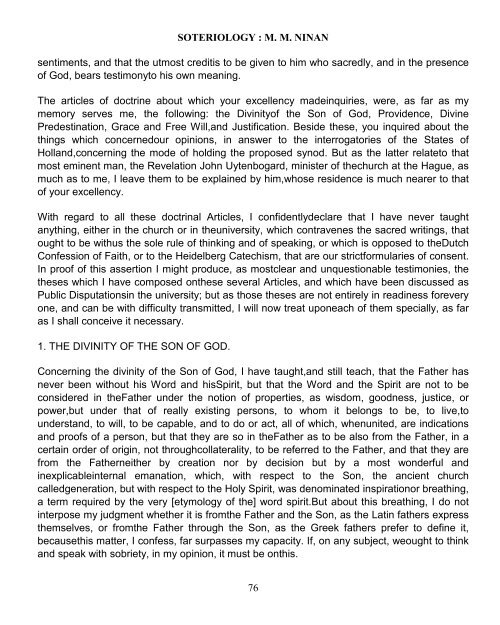Theodicy Soteriology, Hermeneutics
You also want an ePaper? Increase the reach of your titles
YUMPU automatically turns print PDFs into web optimized ePapers that Google loves.
SOTERIOLOGY : M. M. NINAN<br />
sentiments, and that the utmost creditis to be given to him who sacredly, and in the presence<br />
of God, bears testimonyto his own meaning.<br />
The articles of doctrine about which your excellency madeinquiries, were, as far as my<br />
memory serves me, the following: the Divinityof the Son of God, Providence, Divine<br />
Predestination, Grace and Free Will,and Justification. Beside these, you inquired about the<br />
things which concernedour opinions, in answer to the interrogatories of the States of<br />
Holland,concerning the mode of holding the proposed synod. But as the latter relateto that<br />
most eminent man, the Revelation John Uytenbogard, minister of thechurch at the Hague, as<br />
much as to me, I leave them to be explained by him,whose residence is much nearer to that<br />
of your excellency.<br />
With regard to all these doctrinal Articles, I confidentlydeclare that I have never taught<br />
anything, either in the church or in theuniversity, which contravenes the sacred writings, that<br />
ought to be withus the sole rule of thinking and of speaking, or which is opposed to theDutch<br />
Confession of Faith, or to the Heidelberg Catechism, that are our strictformularies of consent.<br />
In proof of this assertion I might produce, as mostclear and unquestionable testimonies, the<br />
theses which I have composed onthese several Articles, and which have been discussed as<br />
Public Disputationsin the university; but as those theses are not entirely in readiness forevery<br />
one, and can be with difficulty transmitted, I will now treat uponeach of them specially, as far<br />
as I shall conceive it necessary.<br />
1. THE DIVINITY OF THE SON OF GOD.<br />
Concerning the divinity of the Son of God, I have taught,and still teach, that the Father has<br />
never been without his Word and hisSpirit, but that the Word and the Spirit are not to be<br />
considered in theFather under the notion of properties, as wisdom, goodness, justice, or<br />
power,but under that of really existing persons, to whom it belongs to be, to live,to<br />
understand, to will, to be capable, and to do or act, all of which, whenunited, are indications<br />
and proofs of a person, but that they are so in theFather as to be also from the Father, in a<br />
certain order of origin, not throughcollaterality, to be referred to the Father, and that they are<br />
from the Fatherneither by creation nor by decision but by a most wonderful and<br />
inexplicableinternal emanation, which, with respect to the Son, the ancient church<br />
calledgeneration, but with respect to the Holy Spirit, was denominated inspirationor breathing,<br />
a term required by the very [etymology of the] word spirit.But about this breathing, I do not<br />
interpose my judgment whether it is fromthe Father and the Son, as the Latin fathers express<br />
themselves, or fromthe Father through the Son, as the Greek fathers prefer to define it,<br />
becausethis matter, I confess, far surpasses my capacity. If, on any subject, weought to think<br />
and speak with sobriety, in my opinion, it must be onthis.<br />
76


















